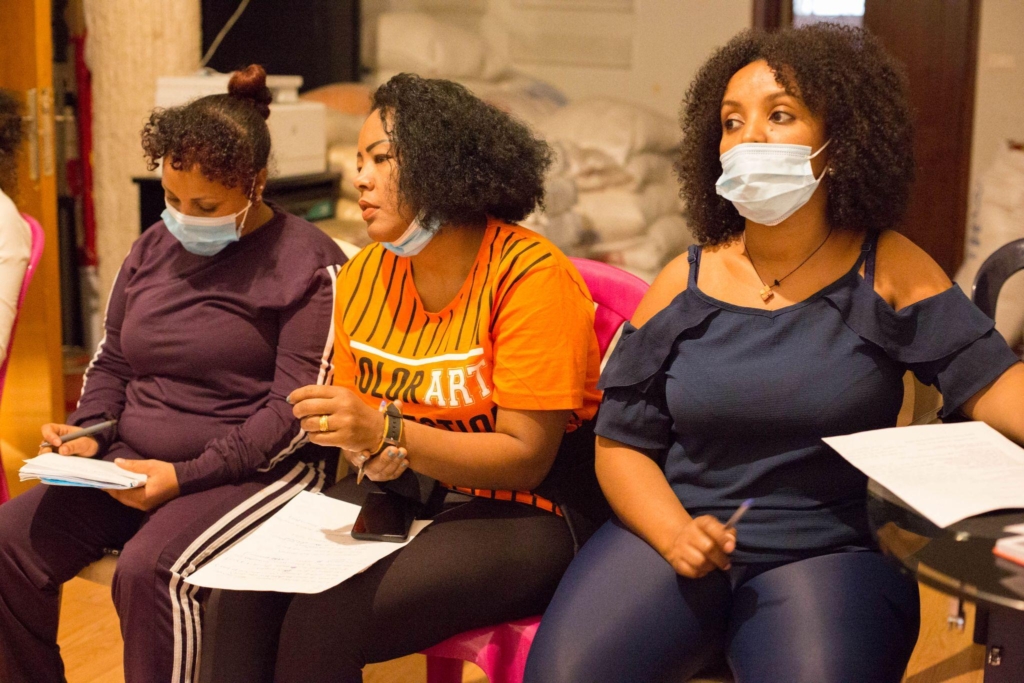En Bref
Au Liban, il est fréquent que les familles un peu aisées embauchent une femme éthiopienne ou philippine. Véritable bonne, à elle revient la charge du foyer : cuisine, ménage, garde des enfants… Problème : l’Etat libanais ne les protège ni des maltraitances physiques et psychologiques dont elles font l’objet dans ces familles. Ces femmes qui ne jouissent d’aucun droit sont parfois accusées de vol à tort par leurs patrons lorsqu’elles osent réclamer un jour de repos ou leur salaire. En l’absence de protection, les femmes éthiopiennes se défendent elles-mêmes. L’association Egna Legna Besidet subvient aux besoins des domestiques chassées par leurs employeurs, et essaye de les faire sortir de prison, avant de leur permettre de rentrer en Ethiopie si elles le souhaitent.
Publié en janvier 2022 sur Reasons to be cheerful
“I am alive today because Egna Legna Besidet exists”, says Degche Dametw, flashing a smile while she wipes her tears away. A 23-year-old domestic worker in Lebanon, Dametw is referring to the organization led by Ethiopian women that is helping her flee the country, just as it has helped hundreds of others before her do the same. Egna Legna Besidet provides Dametw with accommodation, food and clothing, and is in the process of returning her to her mother in Ethiopia.

Dametw is one of thousands of domestic workers who have been tricked into migrating to Lebanon. Often, they are lured there by private agencies with false promises of continuing on to work in Europe or Dubai. They make the leap because of unemployment in their home countries — before coming to Lebanon, 60 percent of migrant domestic workers were unemployed, according to the International Labor Organization (ILO). But once there, they are immediately marginalized by a sponsorship system known as kafala, which allows them to stay in Lebanese territory only on the condition that they have an employer to sponsor their visa.
This system renders domestic workers vulnerable to repeated abuses. Dametw, for instance, who was 21 when she arrived in Lebanon, discovered that she would receive $150 per month as a live-in maid, not the $250 she was promised. Her employer then accused her of breaking something in the house and threatened her with legal action if she did not pay compensation. Unable to pay, Dametw fled the house only two weeks into her contract. In doing so, she lost her legal right to remain in Lebanon.
For Dametw, running away from her first employer’s house marked the start of a precarious life. For more than a year, she moved between underpaid, sometimes abusive jobs, and unemployment, going hungry and spending nights on the streets.
Migrant workers are excluded from the Lebanese labor law. They can’t find a new job without their current employer’s consent, and “face highly exploitative working conditions, akin to modern-day slavery,” according to the ILO. In Lebanon, it is believed that 250,000 people are living and working under kafala, with women accounting for 76 percent of them. Ethiopian women make up nearly half of these women.
False accusations of theft are common within the Lebanese kafala system, as is withholding of wages and physical abuse. News of Ethiopian women found dead or disappeared are regular in Lebanon.
Dametw could have been one of those victims if not for Egna Legna Besidet’s support. “I found out about it through Facebook and reached out to the founder, Banchee Yimer,” she says. “We chatted from time to time, until one day, I was homeless after having worked for 600,000LL (USD$27) a month and I couldn’t afford food anymore. I told her I cannot live anymore.”
Egna Legna Besidet provided Dametw with immediate support. From Canada, where she currently lives, Yimer sent someone to connect with Dametw in Beirut. The organization has since provided her with food, shelter and training.
In four years, this organization, led by women who have been domestic workers themselves, has helped 15,000 women like Dametw survive in Lebanon or escape the country altogether. Covid-19 threw the group’s relevance into relief. Some Lebanese families fired their maids, sometimes owing them back pay or refusing to finance their return ticket. As a result, many Ethiopian workers were stranded in Lebanon, homeless, for months on end.
Relying on a pre-existing network
Yimer refers to herself as “a victim of the kafala system,” having worked in Lebanon without payment for six months and sleeping on balconies. She made the most of her seven-year stay there, building an organization that would give Ethiopian women “a voice.”
“The church and the embassy here are all headed by men,” she says, “and I wanted to create a feminist organization to fight for our community.”
Yimer and her fellow founding members built Egna Legna Besidet by leveraging a pre-existing community that is larger than just the Ethiopian domestic workers. The Alliance of Domestic Workers in Lebanon, a group of women that advocates for migrant workers’ rights, and the Migrant Community Center (MCC), a safe space where migrants can meet and organize, trained her in English language and fundraising.

While these two organizations “deliver good information,” they encompass all nationalities and thus don’t address the specific challenges that the Ethiopian community faces, according to Yimer.
“The moment I arrived at the MCC, I realized that most of us can’t even talk about our body parts as we are raised in a very strict religious culture,” she says. Four years later, Egna Legna Besidet tackles this issue with workshops about family planning and sexual harassment.
“Rape is rape,” reads a poster on the wall of the organization’s headquarters. In the adjacent room, deputy director Tsigereda Brihanu, who has “Hopeless Romantic” tattooed on her forearm, coordinates with lawyers and the Lebanese government to secure exit visas for the women who wish to be repatriated to Ethiopia. She also corresponds with maids detained in Lebanese jails to help get them out.
Brihanu scrolls through a WhatsApp conversation. Dametw’s name appears on the screen. Egna Legna Besidet has settled the $454 fine that she got for illegally staying in Lebanon.
“We are now awaiting the permission from the general security, the administration in charge of migrant workers, to grant her permission to exit the country,” she says. “It could happen tomorrow or in a month.”



